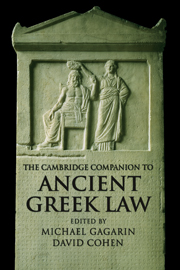Book contents
- Frontmatter
- Introduction
- Part 1: Law in Greece
- Part 2: Law in Athens I: Procedure
- Part 3: Law in Athens II: Substantive Law
- Part 4: Law outside Athens
- Part 5: Other Approaches to Greek Law
- 19 Law, Attic Comedy, and the Regulation of Comic Speech
- 20 Greek Tragedy and Law
- 21 Law and Political Theory
- 22 Law and Nature in Greek Thought
- Bibliography
- Index
20 - Greek Tragedy and Law
from Part 5: - Other Approaches to Greek Law
Published online by Cambridge University Press: 28 August 2006
- Frontmatter
- Introduction
- Part 1: Law in Greece
- Part 2: Law in Athens I: Procedure
- Part 3: Law in Athens II: Substantive Law
- Part 4: Law outside Athens
- Part 5: Other Approaches to Greek Law
- 19 Law, Attic Comedy, and the Regulation of Comic Speech
- 20 Greek Tragedy and Law
- 21 Law and Political Theory
- 22 Law and Nature in Greek Thought
- Bibliography
- Index
Summary
METHOD
Greek tragedy abounds with political crises - struggles over wrongdoing and punishment, efforts to overturn or found regimes, contention about the rights of strangers and the weak. Clearly, punishment, constitutions, and asylum were all real legal issues in Athens, and the city had extensive institutions for dealing with them, some of which even work their ways into the plays as instruments available to the protagonists for resolving (or trying to resolve) their problems. Most famously in the Oresteia the Areopagus Court, with Athena's expert help, decides the fate of Orestes (Eum. 470-752) as does the Argive Assembly in Euripides' Orestes (866-956). Some form of conceptual continuum links tragedy and Athenian legal and political thought. But, because the political and legal crises of drama exist entirely in the realm of the imagination, what can be learned from them about the historical reality of law in Athens?
Scholars working on English-language literary texts have recently refined techniques for analyzing law and literature together. Following the lead of eminent legal historian F. W. Maitland, who argued that “law and literature grew up together in the court of Henry II,” scholars have been exploring how concepts that developed in the legal arena - e.g., contract, evidence, testimony, privacy - have affected literature and, inversely, how narrative techniques developed by writers have provided tools to lawyers and judges.
- Type
- Chapter
- Information
- The Cambridge Companion to Ancient Greek Law , pp. 374 - 393Publisher: Cambridge University PressPrint publication year: 2005
- 6
- Cited by

